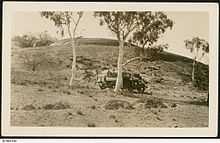Coniston (Northern Territory)


Coniston, Northern Territory, Australia is a cattle station in central Australia.
Coniston is best known as the site of the Coniston massacre, which was the last known massacre of Indigenous Australians, in August 1928. Owing to a severe drought, the original owners (the aborigines) gravitated towards their ancient water sources, which the pastoralists were using for their livestock. Conflicts soon arose.[1]
Coniston is still a working cattle station, and has been featured by the Northern Territory government for its introduction of a 6.4 kW solar power station. Developed in 1923 by Randall Stafford[2] because of a sustainable water supply, the station still thrives today.
Last year, (2014) Max Lines, found himself bedbound. Together with his wife Jacqui, Max has owned and managed Coniston Station[3], about 250 kilometres north-west of Alice Springs, for more than three decades.
With the help of her family and loyal staff, Jacqui is continuing to run the property.
See also
- Coniston (Northern Territory) is at coordinates 22°02′35″S 132°29′28″E / 22.043°S 132.491°ECoordinates: 22°02′35″S 132°29′28″E / 22.043°S 132.491°E
References
- ↑ "Coniston :: History". coniston.pawmedia.com.au. Retrieved 2015-05-01.
- ↑ "Northern Territory Cattlemen's Association - Advancing and protecting the interests of Cattle Producers in the Northern Territory". www.ntca.org.au. Retrieved 2015-05-01.
- ↑ "Coniston without the boss". ABC Rural. Retrieved 2015-05-01.